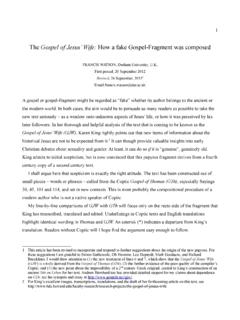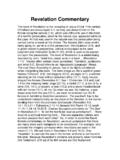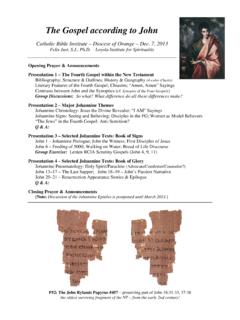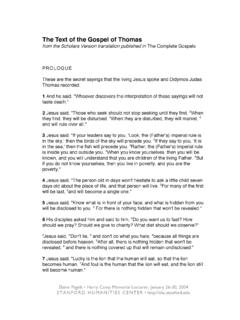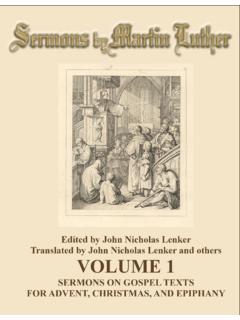Transcription of A look at the Parables of Jesus in Thirty Five Lessons
1 0A look at the Parables of JesusinThirty five LessonsEdited By David Webb1 Table of ContentsLessonsPageIntroduction to The Parables of the Kingdom of Parable of the Parable of the Wheat and the Parable of the Growing Parable of the Mustard Parable of the Parable of the Hidden Parable of the Pearl of Great Parable of the Parable of the Parable of the Unmerciful Parable of the Laborers in the Parable of the Two Parable of the Wicked e Parable of the Wedding Parable of the Wise and Foolish Parable of the Parable of the Two Parable of the Good Parable of the Friend at of the Rich Parable of the Barren Fig Parable of Taking the Lowest Parable of the Great Parable of the Lost Parable of the Lost Parable of the Lost Son (the Prodigal Son) Parable of the Unjust Parable of the Rich Man and Parable of the Unprofitable Parable of the Persistent Parable of the Tax Collector and the Parable of the Parables of Jesus - Conclusion85 The Parables of JesusIntroductionThe word parable is a transliteration of the Greek word parabole (para-bow-LAY), andcomes from two Greek words, para (translated beside ) and ballein (translated tothrow ).
2 Literally, the word parable means to throw beside, or to place beside, or toplace together for the purpose of comparing, or making a comparison. They canusually be identified by the use of the word like, as in Jesus statement, The kingdomof heaven is like a mustard seed, or The kingdom of heaven is like leaven (Matthew13:31, 33). In these examples, Jesus was comparing the kingdom of heaven to theattributes or characteristics ofa mustard seed and to leaven (yeast). Some havedefined the word parable as a story by which something real in life is used as a meansof presenting a moral thought. Others have said a parable puts the known next tothe unknown so that we may learn.
3 They are usually a story or a narrative taken fromnature or from everyday human experiences. Perhaps thesimplestdefinition of all isthat a parable is an earthly story with a heavenly characters in Parables do only those things we wouldexpect anyone to do in thenormal course of events such as a sower going out into a field to sow seed, or amerchant going to the marketplace to find costly pearls. The characters in Parables arenot superhuman, nor do they perform superhuman feats. The natural events describedin Parables are also those we would expect to witness in nature such as seed sown bya sower falling on various kinds of soil, or a mustard seed growing into a large tree, or adrag net bringing all kinds of fish.
4 Parables arenot allegories, fables, myths, orproverbs. In fact, there is a major difference between these forms of story-telling. Forexample, an allegory is simply defined as a figurative application or illustration takenfrom real historical facts or events asin the allegory of Abraham s two sons (Galatians4:22-5:4). On the other hand, Parables speak of supposed events that never reallyoccurred. Fables and myths are stories that are fantasy or larger-than-life. A goodexample from the Old Testament is thefable of trees that choose a king (Judges 9:8-15). Proverbs are defined as short statements that contain a complete and valuablethought, or short, wise sayings that contain practical truths that are learned byexperiences or through observation.
5 Sometimes proverbs and Parables are confused,as in the so-called Parable of the Fig Tree (Matthew 24:32), which is actually aproverb a comparative truth learned by experience and are among the oldest and most common forms of teaching. Even the OldTestament contains many Parables . One classic example is Nathan s parable to Davidabout the poor man with one little ewe lamb (2 Samuel 12:1-10). During His earthlyministry, Jesus used this medium of teaching almost constantly, and fora very goodpurpose. It seems Jesus wanted to teach one part of the crowd that constantly2followed Him, while intentionally preventing the other part from understanding whatwas being said.
6 In other words, the main purpose for Jesus teaching in parableswas toconcealthe truth from those whose hearts were already prejudiced and hardened. And the disciples came and said to Him, Why do You speak to them inparables? He answered and said to them, Because it has been given toyou to know the mysteriesof the kingdom of heaven, but to them it hasnot been given. For whoever has, to him more will be given, and he willhave abundance; but whoever does not have, even what he has will betaken away from him. Therefore I speak to them in Parables , becauseseeing they do not see, and hearing they do not hear, nor do theyunderstand. And in them the prophecy of Isaiah is fulfilled, which says: Hearing you will hear and shall not understand, and seeing you will seeand not perceive; for the hearts of this people have grown dull.
7 Theirears are hard of hearing, and their eyes they have closed, lest they shouldsee with their eyes and hear with their ears, lest they should understandwith their hearts and turn, so that I should heal them. But blessed areyoureyes for they see, and your ears for they hear; for assuredly, I say toyou that many prophets and righteous men desired to see what you see,and did not see it, and to hear what you hear, and did not hear it. (Matthew 13:10-17)The disciples of the Lord were blessed to learn the mysteries of the kingdom ofheaven because they had the right attitude toward Jesus and His teaching. But thosewhose hearts had been hardened by their own wickedness and rebellion were kept fromunderstanding the , Jesus was attempting to separate truth-seekers from curiosity-seekers.
8 Those of His disciples who were genuinely seeking toknow the truth so that they might obey it would ask Jesus , explain to us the meaningof the parable. He would thenexplain the meaning of the parable to them privately(cf. Mark 4:33-34). The hearts of these disciples were open and receptive to the truthstaught by Jesus . Therefore, Jesus said, For whoever has [an honest and receptiveheart], to him more will be given, and he will have abundance [by virtue of the fact thatthey will learn and apply the teachings of Jesus in their lives] (Matthew 13:12a). Butthose who, for most part, were not interested in obeying the teachings of Jesus wouldhear the Parables , fail to grasp their meaning, and simply brush them off.
9 This is whyJesus added, but whoever does not have [an honest and receptive heart], even whathe has will be taken away from him [by virtue of the fact that he will fail to makeapplication of Jesus teaching to his life] (Matthew 13:12b). The reason these hearersfailed to grasp the meaning of the Parables of Jesus is because the hearts of thispeople have grown dull. Their ears are hard of hearing, and their eyestheyhaveclosed, lest they shouldsee with their eyes and hear with their ears, lest they shouldunderstand with their hearts and turn, so that I should heal them. (Matthew 13:15).They had closed their own eyes and ears from receiving the , there is another reason why Jesus taught in Parables , and that was torevealheavenly truths to just a select group of people whose hearts were open andreceptive to these truths.
10 Jesus was taking the known (earthly truths contained in theparables) and using them to explain the unknown (the greater heavenly truths). Onlythen would they be able to make a spiritual application or gain spiritual insight from theparables of Jesus . Repeatedly, the Savior said, the kingdom of heaven is like. Hewould then proceed to draw a comparison between the known and the unknown mysteries of the kingdom of heaven. But there is also another reason why Jesus taught in Parables , and that was toappealto the hearer s sense of justice before they realized the parable applied to didthis with David (2 Samuel 12:1-10). But Jesus used this approach oftenwhen confronting His enemies.
